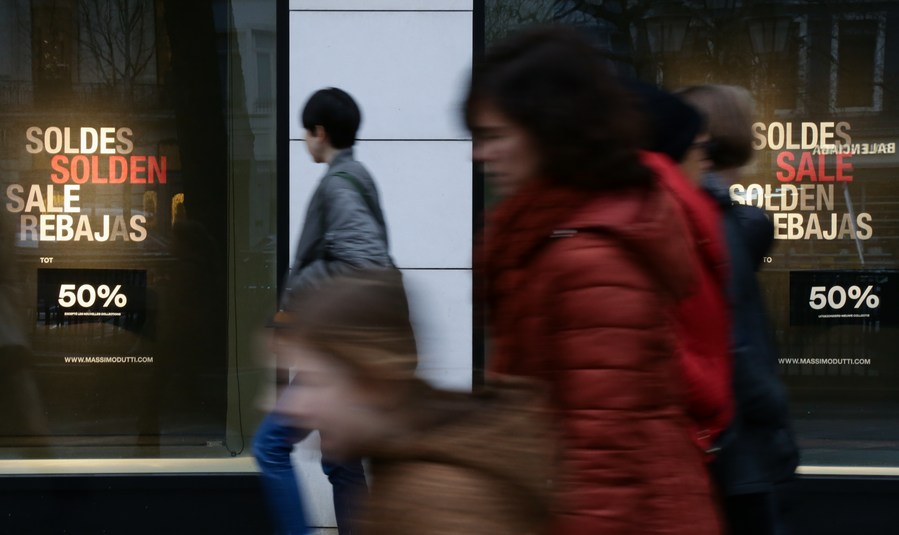
Pedestrians walk on a business street in Brussels, Belgium, Jan. 3, 2023. (Xinhua/Zheng Huansong)
"While the improving inflation environment will be encouraging for the European Central Bank (ECB)," Bert Colijn, senior economist for the eurozone at ING, said, "we expect the ECB to continue raising interest rates in July and September."
BRUSSELS, June 30-- Yearly inflation in the eurozone is expected to fall to 5.5 percent in June, compared to 6.1 percent in May, according to a flash estimate published on Friday by Eurostat, the statistical office of the European Union (EU).
The main driver of eurozone inflation continues to be the price of food, alcohol, and tobacco, which saw year-on-year inflation of 11.7 percent in June. However, this already represents a downward trend from a 12.5 percent inflation in May.

People walk past a store in Berlin, Germany, on Feb. 1, 2023. (Photo by Stefan Zeitz/Xinhua)
Non-energy industrial goods are projected to have a yearly inflation of 5.5 percent in June, compared to 5.8 percent in May.
The price of services is likely to increase from yearly inflation of 5 percent in May to 5.4 percent in June.
Energy prices continue to have negative growth, declining from year-on-year inflation of -1.8 percent in May to -5.6 percent in June.
In terms of individual countries, Slovakia is leading with a yearly inflation rate of 11.3 percent in June, followed by Estonia with 9 percent and Croatia with 8.3 percent. Conversely, Luxembourg has had the lowest year-on-year inflation in June at 1 percent, with Spain and Belgium registering the second lowest rate of 1.6 percent each.
Bert Colijn, senior economist for the eurozone at ING, noted that despite headline inflation dropping, core inflation increased slightly from 5.3 percent to 5.4 percent. He attributed this trend to the impact of the German government's support measures to counter inflation in the services sector last year.
Colijn said he was concerned about labor market trends, stating that wage growth will persist due to low unemployment. Selling prices are expected to continue decreasing, while cost pressures unrelated to wages have diminished. Demand pressure remains low due to a sluggish economic environment.

A price board is seen at a gas station in Berlin, Germany, on Feb. 1, 2023. (Photo by Stefan Zeitz/Xinhua)
"While the improving inflation environment will be encouraging for the European Central Bank (ECB)," Colijn said, "we expect the ECB to continue raising interest rates in July and September."










